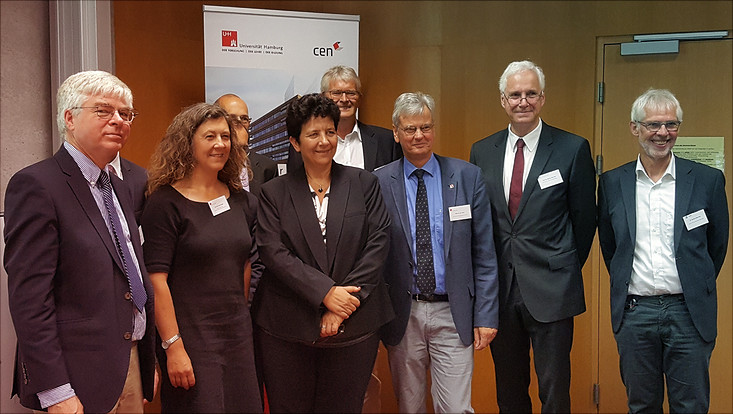Universität Hamburg receives visit from French Minister of Higher Education
1 September 2017, by CEN Universität Hamburg

Photo: UHH/CEN/A. Allner
This Friday, 1 September 2017, Frédérique Vidal, the French Minister of Higher Education, Research and Innovation visited our University. She showed particular interest in climate research. During a recent meeting in Paris, Vidal and her German counterpart Johanna Wanka had agreed to cooperate closer on addressing future challenges—with a focus on international climate and energy research.
According to Prof. Dr. Dieter Lenzen, president of Universität Hamburg, her visit sends an important message: “Right now people in Texas are suffering from the consequences of a devastating natural disaster—although climate change is frequently called “fake news” in the USA. I am delighted that France, particularly the French Minister of Higher Education, places special value on climate research and holds Universität Hamburg in high regard as an authority in the field. As University for a Sustainable Future, it is our specific aim that the key research areas Climate, Earth, Environment and the Climate Cluster of Excellence CliSAP make a major contribution to international climate science.”
In the morning, the French Minister first met with climate researchers from Universität Hamburg, the Max Planck Institute for Meteorology (MPI-M), and the Helmholtz Zentrum Geesthacht Centre for Materials and Coastal Research (HZG). Forming the successful Cluster of Excellence for Climate System Analysis and Prediction (CliSAP), these institutions have received funding from the German Research Foundation (DFG) since 2007. “Ensuing from the Franco-German Ministerial Council in July 2017, which facilitated the expansion of Franco-German efforts against climate change, this [destination] was a logical choice. CliSAP ranks among the most important centers of climate research, especially in modeling, which is fundamental to the field and has a potential for furthering cooperation between Germany and France and at a European level,” says Frédérique Vidal.
In the same vein, Prof. Dr. Detlef Stammer, director of the University’s Center for Earth System Research and Sustainability (CEN), emphasizes the relevance of strengthened collaboration: “France and Germany are cooperating on numerous areas of climate science: How does the climate system change? What countermeasures are possible, what adaptations called for? But also: How do individuals, companies, and nations make climate-relevant decisions? In the context of the COP21 Agreement in Paris, strong solidarity is more important than ever for meeting the climate goals.”
Minister Vidal later joined physicist and vice president of Universität Hamburg, Prof. Dr. Jan Louis, for a talk. Together they inspected the nearby German Climate Computing Center (DKRZ), whose high performance computing systems are significant climate science tools. German analyses and prognoses developed here form an important basis for the World Climate Report IPCC.
If you have any further questions, please contact:
Merel Neuheuser
Universität Hamburg
Presidential Press Officer
Tel: +49 40 42838-1809
merel.neuheuser"AT"uni-hamburg.de
